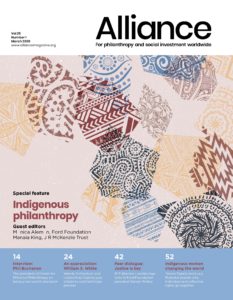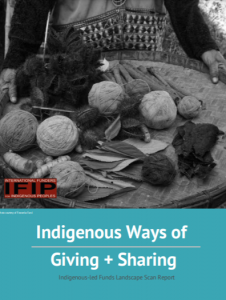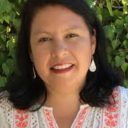There are 476 million Indigenous Peoples globally, representing 6.2 per cent of the world’s population. By all measures across philanthropy, Indigenous people are underrepresented. Simply put, Indigenous Peoples represent the most prominent blind spot in the funding community.
Philanthropic giving has been poured into training, learning tools, and events about diversity, equity, and inclusion, but the needle has hardly moved on funding to Indigenous communities. The fact is, Indigenous Peoples are underfunded and underrepresented across all issues and movements. In response, Indigenous People have been organising to address this gap by establishing philanthropic foundations, funds and advocating for funding mechanisms led and managed by Indigenous Peoples to address the lack of funding going directly to their organisations and communities.

Read Alliance magazine’s issue on Indigenous philanthropy
Indigenous Led Funds navigate a sector that has systemically excluded Indigenous Peoples from directly accessing funding resources. Only 0.4 per cent of U.S. philanthropic giving is directed to Native American communities in the U.S. In Australia, only 0.5 per cent of philanthropic funding goes to First Nations communities.
In Canada, charities serving Indigenous peoples receive only one per cent of overall donations. Five per cent of all global human rights funding supports Indigenous Peoples and only 1.2 per cent of all global giving by U.S. foundations went to Indigenous Peoples between 2011-2015. Philanthropy must not continue this path nor ignore the demands and calls for justice. Indigenous Peoples are rights holders, possess knowledge, expertise, and lead holistic approaches to solutions to the many crises we face as a global community. Indigenous-led funds offer the funding community a path forward and away from colonising practices to practices that support Indigenous Peoples’ leadership, rights, and self-determination.
Indigenous Peoples represent the most prominent blind spot in the funding community.
In 2018, International Funders for Indigenous Peoples (IFIP) hosted the first global gathering of Indigenous Led Funds in Santa Fe, New Mexico. This first global gathering was not only historical but powerful and inspiring. The event represented the first time Indigenous Funds from around the world convened to learn about each other’s work, challenges and aspirations. At the second global gathering, co-hosted by The Circle on Philanthropy and Aboriginal Peoples in Canada in 2019, the idea was born to create an Indigenous Led Funds Working Group hosted by IFIP. The Indigenous Led Funds Working Group is a dedicated platform that brings together Indigenous funds worldwide to collaborate, organise, and mobilise a wave of change in philanthropy for self-determination.
What are Indigenous Led Funds?
Indigenous Led Funds (ILFs) are guided by Indigenous worldviews and led by and for Indigenous Peoples. ILFs strengthen self-determination and support a process that empowers communities, at the local to the global level, to change paradigms, address the asymmetry of powers and resources, and shift relationships towards those based on recognition and reciprocity. Indigenous Led Funds exist all over the world. Some ILFs are funding internationally, sometimes spanning several countries but always working in partnership with Indigenous networks and communities. They have strategies that engage multi- and inter-culturally to respond to the needs of diverse Indigenous communities. Other ILFs operate nationally in scope, or are even community-based, taking a more localised approach. Their work is ingrained in the history, relationships, and fabric of their own communities and cultures.
Supporting and funding Indigenous Led Funds
 The Indigenous Led Funds Landscape Scan Report is the first of its kind that focuses on global Indigenous-led giving as guided and informed by Indigenous Funds. It is a starting point to bring together the wealth of knowledge about Indigenous Led Funds and the wisdom of Indigenous leaders in philanthropy. It also serves to provide funders with an understanding of effective and decolonised approaches to grantmaking that align, respond, include, and support Indigenous communities’ knowledge and priorities. As the report highlights, funding Indigenous Led Funds acknowledges the leadership, expertise and knowledge of the funds and recognises that ILFs are closest to communities and understand what works best.
The Indigenous Led Funds Landscape Scan Report is the first of its kind that focuses on global Indigenous-led giving as guided and informed by Indigenous Funds. It is a starting point to bring together the wealth of knowledge about Indigenous Led Funds and the wisdom of Indigenous leaders in philanthropy. It also serves to provide funders with an understanding of effective and decolonised approaches to grantmaking that align, respond, include, and support Indigenous communities’ knowledge and priorities. As the report highlights, funding Indigenous Led Funds acknowledges the leadership, expertise and knowledge of the funds and recognises that ILFs are closest to communities and understand what works best.
Supporting ILFs is an act of rebalancing historical inequalities and decolonising philanthropy. Indigenous Funds understand how to use funding resources most effectively and hold stronger trust with their communities and partners. Indigenous giving practices encompass so much more than values-based, participatory, and trust-based grantmaking. It lifts and respects Indigenous views in ways that are connected to sharing, reciprocity, community well-being, and rights.
A call to the funding community
The report calls on the funding community to address the inequities in philanthropy by investing in and increasing funding resources directly accessed by Indigenous people. The report is an invitation for actors within the philanthropic community to reflect on their power and privilege, let go of structures that hinder and prevent their institutions from directly funding, and listening to Indigenous Peoples’ leadership. IFIP calls on the funding community to adopt practices based on the 4Rs of Indigenous Philanthropy: Respect, Responsibility, Reciprocity and Relationships, and to right the wrongs of the past. It’s time to partner and support Indigenous Peoples.
Lourdes Inga is the Executive Director of International Funders for Indigenous Peoples.
This article was first published by WINGS on 31 March 2021.






Comments (0)